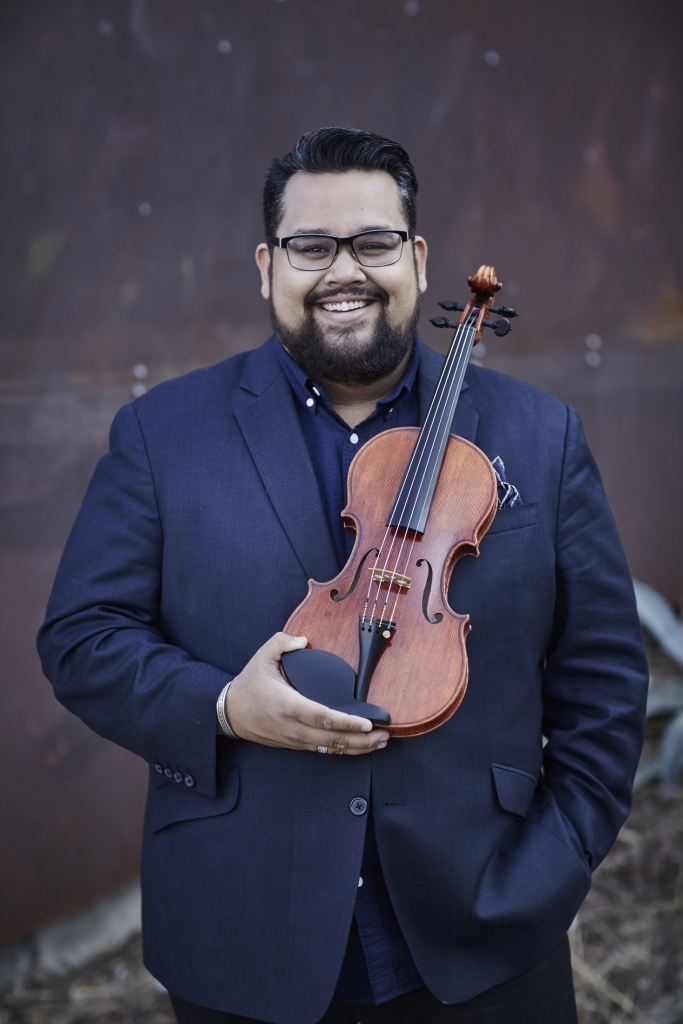
Vijay Gupta

Vijay Gupta
The 33rd Annual Nancy Hanks Lecture on Arts and Public Policy
Vijay Gupta believes that the work of the artist and the work of citizenship is the same: to create the world we want to see in our small, everyday actions—one person, one relationship, and one note at a time.
Hailed as “one of the most radical thinkers in the unradical world of American classical music,” Mr. Gupta is an esteemed violinist and speaker. Mr. Gupta’s labor of love lies in the founding and directing of Street Symphony, which brings music to people in shelters, clinics, county jails and prisons. Mr. Gupta’s work serves to engage people across vast social and economic differences—people who would often never be in the same room together—to create new transformative conversations about belonging and citizenship. Mr. Gupta’s work brings beauty, respite, and purpose to those all too often ignored by society, while encouraging us to reflect on many ways we can all make a difference and truly be citizens in our world today.
We all have a story that matters. Mr. Gupta’s story began just north of New York City in 1987, where he was born to Indian immigrants who immersed him equally in the cultures of West Bengal and Western Europe. Mr. Gupta began playing the violin at a young age, and after only three years of study, auditioned for the Juilliard School of Music Pre-College program. He played his solo debut under the baton of Zubin Mehta and the Israel Philharmonic Orchestra, and as a teenager, toured the U.S., Europe, Japan, and his Indian motherland as a soloist and recitalist. As an undergraduate, he continued to study violin performance while also following a course of study in biology, which led him to research internships at City University of New York and the Harvard Institutes of Medicine where, ironically, he received the most encouragement and support to make a life not as a researcher or doctor, but as a musician. Mr. Gupta continued his musical training at the Yale School of Music before taking an audition for the Los Angeles Philharmonic Orchestra where, in 2007, he became the youngest violinist to win a position in the orchestra’s history.
Soon after joining the orchestra, Mr. Gupta discovered that his new hometown was the epicenter of the crisis of homelessness in America today. Even in the midst of the COVID-19 crisis today, thousands of Angelenos sleep on the streets, and even more are incarcerated in the largest county jail system on the planet—effectively our world’s largest psychiatric facility. In 2010, Mr. Gupta started organizing musical events for audiences he would never meet in Walt Disney Concert Hall, performing classical chamber music with his colleagues across the city at homeless shelters, mental health clinics, hospitals and Veterans centers, Los Angeles county jails and California state prisons—and even the very streets of Skid Row.
As a grassroots movement of music, the musical offerings of Street Symphony encompass not only the world of classical and choral music, but the traditions of Mariachi, Jazz, West-African drumming, Romani music, folk songs, and most importantly, musical offerings from and by the community of Skid Row—music from people who have themselves experienced homelessness and incarceration. In this radical model of hospitality and exchange, the musicians of Street Symphony share their gifts, and their stage, with the community they serve. They learn and grow with each other. Mr. Gupta says that often, the professionals are the ones who walk away with the greater gift.
Mr. Gupta is the recipient of numerous awards and fellowships, including a 2017 Citizen Artist Fellowship from the John F. Kennedy Center for the Performing Arts and a 2018 MacArthur Fellowship..
Each day, Mr. Gupta shares a musical meditation on Instagram centered on the music of Bach, and he encourages you to all follow along @Gupta_violin.
| Access Date | Quiz Result | Score | Actions |
|---|




